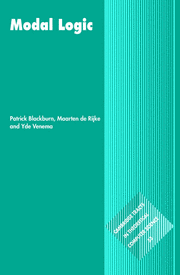Book contents
- Frontmatter
- Dedication
- Contents
- Preface
- 1 Basic Concepts
- 2 Models
- 3 Frames
- 4 Completeness
- 5 Algebras and General Frames
- 6 Computability and Complexity
- 7 Extended Modal Logic
- Appendix A A Logical Toolkit
- Appendix B An Algebraic Toolkit
- Appendix C A Computational Toolkit
- Appendix D A Guide to the Literature
- References
- List of Notation
- Index
Appendix D - A Guide to the Literature
Published online by Cambridge University Press: 05 July 2014
- Frontmatter
- Dedication
- Contents
- Preface
- 1 Basic Concepts
- 2 Models
- 3 Frames
- 4 Completeness
- 5 Algebras and General Frames
- 6 Computability and Complexity
- 7 Extended Modal Logic
- Appendix A A Logical Toolkit
- Appendix B An Algebraic Toolkit
- Appendix C A Computational Toolkit
- Appendix D A Guide to the Literature
- References
- List of Notation
- Index
Summary
Here we list and briefly describe a number of textbooks, survey articles, and more specialized books which the reader may find useful. We have not aimed for comprehensive coverage. Rather, we have commented on the sources the reader is most likely to run into, provided pointers to topics not discussed in this book (in particular, modal proof theory and theorem proving, and first-order modal logic) and drawn attention to some interesting emerging themes.
This is a good place to mention the Advances in Modal Logic initiative, which attempts to bring together scholars working in various areas of modal logic and its applications. You can find out more at: http://www.aiml.net. The collection Advances in Modal Logic, Volume 1, edited by Kracht et al. [281], contains a selection of papers from the first conference hosted by the initiative. Selections from later workshops have also been published; see Advances in Modal Logic, Volume 2, edited by Zakharyaschev et al. [469]; Advances in Modal Logic, Volume 3, edited by Wolter et al. [461]; and Advances in Modal Logic, Volume 4, edited by Balbiani et al. [18].
Textbooks on Modal Logic
To start, here is an annotated list of textbooks on modal logic.
ο A Manual of Intensional Logic, van Benthem [44]. What is modal logic? What is not! This inspiring little book takes the reader on a whirlwind tour of the many faces of modal logic.
- Type
- Chapter
- Information
- Modal Logic , pp. 516 - 523Publisher: Cambridge University PressPrint publication year: 2001

